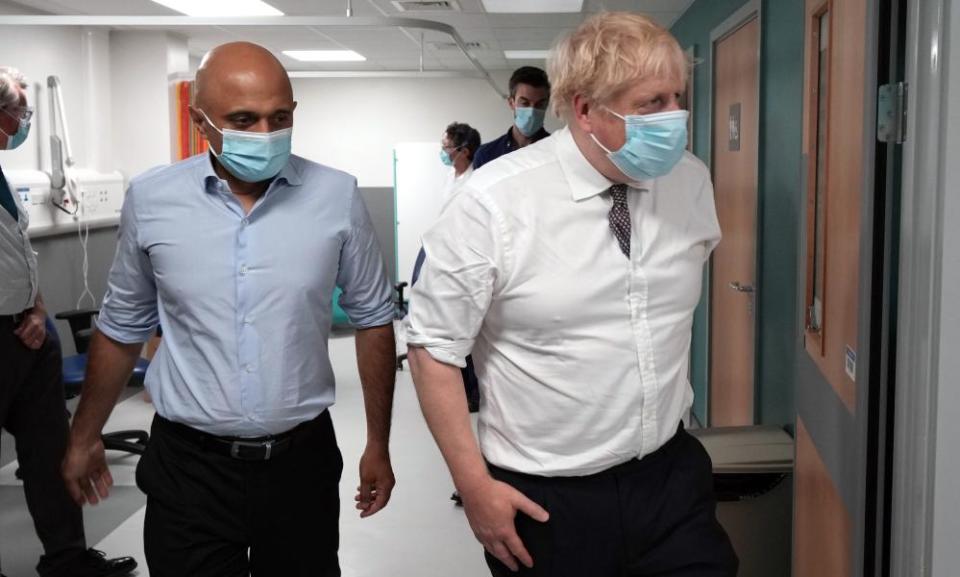The Observer view on the winter crisis facing the NHS

The call to “protect the NHS” was at the heart of the government’s Covid messaging in the first year of the pandemic. Ministers did not always heed their own instructions: their delays in imposing necessary social restrictions, not just in March 2020 but again and again, intensified the intolerable pressures on the NHS, increased the death rate and required longer lockdowns. But ensuring the NHS could continue to function was, alongside saving lives, one of the two main objectives of government policy in the earlier stages of the pandemic.
As we head into our second Covid winter, death rates from the virus are much lower, thanks to the vaccine rollout, although approaching 200 people are still dying from this disease every day. But the pressures on the NHS are no less substantial than going into last winter. It has suffered a quadruple crunch. Excess capacity is at a historical low after a decade of underfunding and a dearth of capital investment; even before the pandemic, NHS hospitals were operating close to full capacity during the quieter summer months and there have been several winters now during which elective treatments have had to be cancelled altogether. There is a long-term staffing crisis afflicting every level of the service, from consultants to healthcare assistants, which means that most hospitals are operating with serious staff shortages. Pressures on the NHS have been further accelerated by a crisis in social care, also caused by underfunding and understaffing, which the Care Quality Commission (CQC) has forecast will leave a “tsunami of unmet need” this winter. This will mean more people end up in hospital when they become ill and stay in hospital longer because the care they need to be discharged back home is not available. On top of all this, the NHS has had the most difficult 18 months in its history as urgent Covid cases have necessarily crowded out other types of healthcare and waiting lists for cancer treatment and pain-relieving surgery have soared.
NHS leaders are warning of a system that cannot take much more. Even before the pandemic, the healthcare compact with citizens – if you need it, the NHS is there for you – was being steadily eroded by underfunding and understaffing. A year and a half into the pandemic and the situation is even worse. Several large hospital trusts have been downgraded by the CQC because of falling standards of care. One NHS hospital trust has had to restrict the provision of chemotherapy. Pressures on the ambulance service have meant that some people are being put on hold for up to 10 minutes when they call 999, it can take hours for an ambulance to arrive even while people are lying in excruciating pain, and ambulances are having to wait in long queues to hand over patients outside A&Es.
There is probably worse to come. Vaccines have reduced the risk of hospitalisation and death, but they have not eliminated it altogether, while data shows that the immunity conferred by vaccines wanes after six months. New Covid infections have reached almost 50,000 a day and the number of deaths from Covid currently stands at more than 1,000 a week. Infection rates in the UK are more than 18 times those in Spain and nine times those in France. Without some action to control infections, the risk is that Covid rates will continue to rise and heap further pressure on the NHS, leading to more deaths not just from Covid but from other conditions that go untreated as a result of the crisis.
The government is simply ignoring the warning signs. Health secretary Sajid Javid has maintained in recent weeks that the NHS is coping and that the pressures are manageable. This is incongruous with what hospital chiefs and frontline staff are reporting. Boris Johnson remains ideologically committed to misleading the country that everything is under control and there is nothing to worry about, while Jacob Rees-Mogg frivolously claimed that Conservative MPs do not need to wear masks in the Commons because they know each other. Labour’s message on what it wants the government to do lacks clarity. Yet senior scientific advisers to the government have warned of the need for caution and for incremental restrictions to manage pressures on the NHS before it is too late.
The government is in danger of repeating the same mistakes it has made over and over again: throwing caution to the wind and leaving it so late to act that the restrictions needed to prevent a collapse in emergency healthcare will in the end be greater. Speeding up the vaccine booster rollout is unlikely to sufficiently control rates of infection. The government urgently needs to put in place its winter plan B, which includes compulsory mask wearing in public places, guidance for people to work from home if possible and vaccine certificates for entry to bars and restaurants, which could boost vaccination rates further. But it must go beyond this: improving sick pay so people on low incomes with Covid symptoms can afford to test and self-isolate and investing in proper ventilation technology in places such as schools. These are measures that will help avoid the need for any further social restrictions over the winter. It is better to implement them now rather than to require more disruptive measures for longer later.
Time and again, Boris Johnson has failed to take more moderate action in the here and now to prevent a greater number of deaths – and even more severe restrictions on our lives – later. All the signs are that he is set to repeat exactly the same mistakes again, but it is not too late for him to shift course.

 Yahoo Finance
Yahoo Finance 